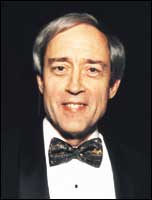 |
 |
 |
 |
|
AROUND THE QUADS
Nine years after he became Columbia's 18th president, George Rupp will step down from the position in summer 2002. Henry King '48, a member of the Board of Trustees, has been named to chair a search committee to find a successor to Rupp, who announced his decision at a Board meeting on March 3. King also chaired the search committee that brought Rupp to the University in July 1993. Joining King on the search committee are trustees Jose Cabranes '61, Stephen Friedman '62L, Ellen Kaden '77L, Marilyn Laurie '59 Barnard, David Stern '66L and George Van Amson '74, faculty members Hilary Ballon, Paul Duby '62E, Eric Kandel and Koji Nakanishi and students Rohit Aggarwala '93, '00B and Sofia Berger '01, 02E. Aggarwala is a graduate student in history and teaches Contemporary Civilization while Berger is in the 3-2 College-Engineering program. Rupp, 58, who had been dean of the Harvard Divinity School and president of Rice University before coming to Columbia, said he had "no definite plans" for the future, although he indicated he "would certainly welcome the opportunity to return to the teaching and writing I intended to pursue when I first became a faculty member." He added that he would not become the president of another university. In an interview published in the spring-summer 1993 issue of Columbia College Today, Rupp was asked by former editor James C. Katz '72 what he hoped his legacy at Columbia would be. In light of developments, his response was revealing: "I will feel very satisfied if, at the end of my presidency - let's say 10 years, give or take a bit - all of us look back on Columbia and say this University is a better institution now than it was 10 years ago. And better, I hope, will mean financially on a solid grounding, having even better students and faculty, continuing to have a distinguished curriculum, having enlisted vigorous support from alumni, not only from New York but from across the country. In short, better in the ways in which Columbia has been excellent in the past. That's my ambition, rather than that we will have added new schools or institutes or departments. I think we need to be looking ahead in a way that builds on the core strengths of the institution and make sure those are solidly grounded and of very high quality." Clearly, Rupp achieved much of what he set out to accomplish, particularly when it comes to getting the University in better fiscal shape. His tenure will be remembered for a highly successful capital campaign that raised over $2.8 billion and more than doubled the University's endowment to over $4.2 billion (as of June 30, 2000). Also, under Rupp, Columbia has become the country's most productive patent-licensing university with $143.6 million in revenue in fiscal year 2000. Rupp's legacy also features a $1.5 billion overhaul of the school's physical plant that is ongoing; the establishment of 159 new named professorships and recruitment of noted scholars such as Nobel Laureate Horst Stormer, Simon Schama, Gerald Fischbach and Jon Elster; a refocused emphasis on multi-disciplinary efforts in teaching and research that has produced numerous new centers such as the Earth Institute; and a surge in admissions applications across the board and especially at the College. Shortly after becoming president, Rupp pledged to reestablish
undergraduate education as the center of the University. During his
presidency, applications to the College have more than doubled, the
admittance rate has dropped from over 30 percent to below 13
percent and students now benefit from the new Lerner Hall student
center and Broadway Dorm as well as the renovated Milstein Family
College Library, among other capital improvements.
|
|
||||||||||||||||||||||||||||||||||||||||||||||||||||||||||||||||||||||||||||
